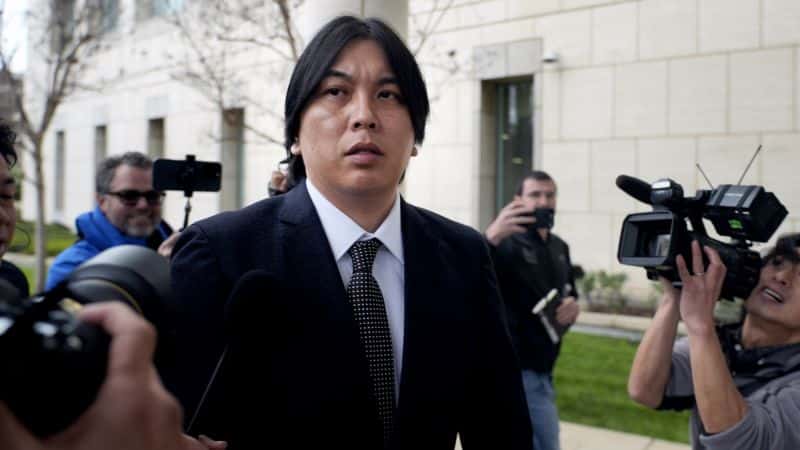Shohei Ohtani’s former translator, Ippei Mizuhara, has been sentenced to four years and nine months in prison for embezzling nearly $17 million. This case highlights the fragility of trust in the sports world and the impact of gambling addiction.
In a recent shocking case that has sent ripples through the sports community, Ippei Mizuhara, who once provided translation services for baseball star Shohei Ohtani, was sentenced to four years and nine months in prison for his fraudulent activities in sports betting. Mizuhara siphoned nearly $17 million from Ohtani’s bank account through a complex scheme involving banking and tax fraud, resulting in significant financial loss and a breach of personal trust for the Japanese athlete. This case highlights the importance of vigilance in financial matters, particularly for high-profile athletes who may be more susceptible to such betrayals.

Mizuhara’s story is a tragic tale of betrayal and deceit, woven into the fabric of sports culture. He was once a trusted aide to Ohtani, responsible for facilitating the athlete’s smooth transition in the United States. However, behind Mizuhara lay a dark world driven by gambling addiction, a plague that affects many individuals across various walks of life. Beginning in 2021, he manipulated Ohtani’s accounts, impersonating his authorization to wire money, gradually transferring the funds into his own accounts. By 2024, Mizuhara had squandered millions on high-stakes betting across various sports, including baseball cards, international soccer, the NBA, the NFL, and college football. Alarmingly, he never placed any bets on baseball, leaving Ohtani completely unaware of the situation, making him an innocent victim of this betrayal of trust. This raises questions about how to safeguard athletes and their finances from similar schemes in the future.
Understanding the Risks of Sports Betting
Mizuhara’s downfall is not just a story of financial fraud; it also reflects the tragic realities of addiction and poor choices, a narrative that is far too common. His defense attorney recounted in court how Mizuhara fell into a deep cycle of debt and deception due to his gambling. To cover up his crimes, he concocted elaborate lies, deceiving Ohtani’s agents and financial advisors. In a letter written to the court, Mizuhara expressed deep remorse, admitting his wrongdoings and pleading for forgiveness, which showcases the psychological toll that such a lifestyle can take on individuals.
As the central figure in this case, Shohei Ohtani is undoubtedly the most heart-wrenching victim. His trust in Mizuhara was absolute, and this betrayal caused not only substantial financial loss but also profound personal repercussions. The prosecutor emphasized in court that there is no doubt Ohtani is a victim, and his suffering is a direct consequence of Mizuhara’s actions. This case profoundly illustrates the vulnerability faced by celebrities, where trust can be exploited by those closest to them, resulting in an unbearable hurt. It serves as a cautionary tale for others in similar positions to ensure they have strong safeguards in place.
Mizuhara’s case is not just a personal tragedy; it also unveils the issues surrounding illegal sports betting and money laundering activities. His actions are considered part of a larger investigation into illegal gambling networks in Southern California and money laundering operations at Las Vegas casinos. This investigation involves over a dozen individuals and reveals a complex web of illicit activities. While Mizuhara’s involvement is a critical link, the deeper issue lies in the fragility of trust in the sports world in the face of money and addiction. Such networks often prey on the unsuspecting, drawing them into a cycle of crime and despair.
Once a close friend and translator of Ohtani, Mizuhara’s downfall is a painful narrative. He not only betrayed Ohtani’s trust but also destroyed his own reputation and future, casting a long shadow over his once-promising career. Mizuhara’s addiction led him into a relentless cycle of fear of expulsion and reputational ruin, compounded by the stress of maintaining his fraudulent activities. This story serves as a warning that addiction can destroy even the most promising lives, leaving behind trails of regret and shattered trust. It underscores the need for greater awareness and resources for those struggling with addiction, particularly within competitive environments.
In the days ahead, how to prevent similar incidents and maintain trust within the sports community will become an urgent issue that needs addressing. Organizations must establish robust frameworks for financial oversight, ensuring that athletes have access to trusted advisors and protection against potential fraud. Educational programs focusing on the dangers of gambling addiction and signs of financial exploitation should also be a priority, helping to equip athletes with the knowledge they need to protect themselves. The impact of this case will likely resonate within the sports industry for years to come, prompting a reevaluation of how we support our athletes and safeguard their interests.






















